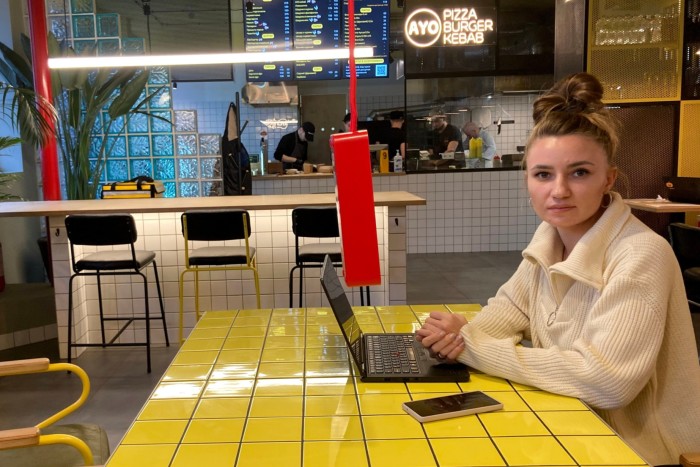Hours after Russia launched one of its largest missile barrages against Ukraine’s infrastructure since Moscow’s full-scale invasion, the residents of Kyiv were using pedal power to ensure the lights did not go out on the Christmas tree at the city’s main train station.
“Ten seconds of light. Ten seconds of jolly mood!” a man dressed up as Santa Claus chanted on Thursday as people lit up the tree. “I wish you all happiness, and most of all, our victory.”
The tree, whose lights are powered by an exercise bike or hand-turned wheels, has become a symbol of Ukraine’s resilience as it prepares to celebrate New Year’s Eve, followed by the Orthodox Christmas on January 7.
Ukraine said its air defences had intercepted 54 of about 70 missiles on Thursday as Russia continued its effort to destroy the country’s infrastructure and plunge it into cold and darkness over the festive period.
But at the railway station that evening, people at the tree were keen to show their holiday — and fighting — spirit remained undimmed.
“It felt . . . as if I was pushing the pedals for all Ukrainians . . . even though there is a war going on, I want everyone to be happy,” said Tetyana after taking her turn.
Her family would continue with their festive celebrations, she said, with “food on the table” and a back-up battery to provide light.
Cheering on the riders with her two-year old daughter, Yevhenia Sontsova said: “This shows Ukraine is very resourceful and that we have innovative minds.”
But despite the holiday mood, the 10-month-old war is taking its toll. Sontsova, who fled to Kyiv earlier this year from a northeastern frontline town, said she was taking her daughter back there after Thursday’s missile strikes on the capital, which were “very loud” and “very scary”.
After Russia began its nationwide air strikes last autumn following its February invasion, businesses in the capital initially kept their doors open, operating by candlelight during blackouts. However, the mood has begun to darken as months of relentless bombardment trigger lengthy power and heating outages in freezing temperatures.
In Kyiv, a city of nearly 3mn which Russia failed to capture in the early days of the war and which lies hundreds of kilometres from the front lines, the relentless grind is once more bringing the war closer to home.
Power rationing has left street lamps and traffic lights dark, making driving perilous, and heating is sometimes off for days. The stench of diesel hangs over the city as businesses power up generators, and flashlights are a must for all that venture out. Residents are using their car batteries to power lighting at home.

“I’m on the edge,” said Alina Yurchenko, who works for an internet retail company. She said the blackouts had made it difficult for her to work at home and that her son was becoming sick because of the cold: “It is tolerable without stable light but it is unbearable without heat.”
Describing the early days of the invasion, when Russian troops bore down on the capital, as “the scariest thing”, it was “now just becoming impossible to function”, she said.
Frustration is mounting among workers struggling to keep basic services running. Staff at one office that maintains residential buildings said that with half the team away fighting, people needed to understand it was hard to make swift repairs.
“Let people worry when I run out of patience. Because if people like me leave now, they won’t have heat here until spring,” one employee added.
“Try to stay awake for four days working around the clock to give people warmth when one of them complains ‘you know, it’s warm in one room, but not warm in the other’ . . . just stay in the warm room.”

Ukrainians remain defiant. According to a recent poll conducted by Kyiv’s Rating Group, 97 per cent of respondents believe Ukraine will win the war. “Over 82 per cent believe that things in Ukraine are going in the right direction,” the polling company said.
People are finding a semblance of normality and solace where they can. One regular customer at the Sunny Bakery coffee bar described the bright white interior on a dark night as “our happiness”.
Alina Kachynska, a manager at the Ayo restaurant, which opened its doors this spring as many Kyiv residents returned to the capital, said business was “not very” profitable due to the cost of running a diesel generator and constant disruptions that kept customers away.
“But how can we not work? We love our job. We prepare tasty food. We have loyal customers who come to us every day. We have to survive this,” she said.

One freezing evening, during a blackout that prevented their children from doing homework, Yulia and a friend strolled with their daughters through a dark park to get some fresh air. “We decided to go for a walk because there is no light . . . why not take a walk?” she said. Her hardships were nothing compared to those faced by soldiers in the field, she added.
Yulia was mulling whether to sign her children up for skating lessons at the ice rink across the street. Trainers there are recruiting novice players for youth hockey teams to replace those whose families have fled abroad.
Viktor, who drives the rink’s ice resurfacer, said diesel generators provided some light but were insufficient to cool the ice, forcing him to clean it “dry”, without adding hot water to form a fresh layer.
“We do our best for the children . . . We will not surrender to anyone but will defeat those bastards and continue to live healthy lives,” he added.
Back at the train station, Santa Claus told the Financial Times that “many hundreds of people have sat on my lap, and 90 per cent of them told me they wished for Ukraine’s victory.
“Such a nation cannot be defeated.”


